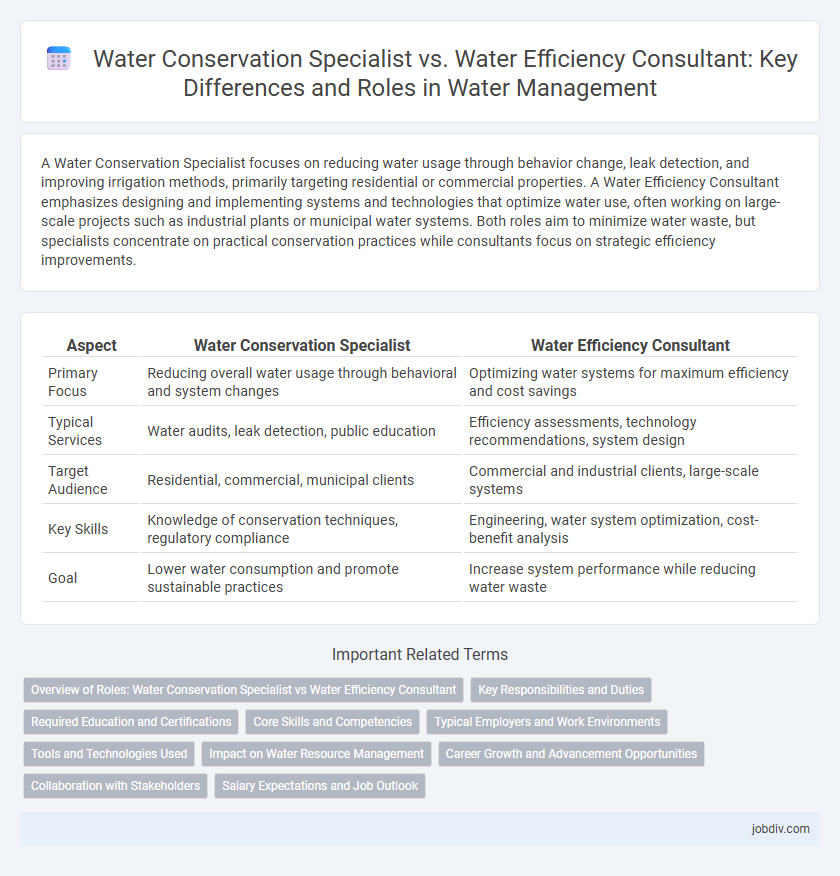A Water Conservation Specialist focuses on reducing water usage through behavior change, leak detection, and improving irrigation methods, primarily targeting residential or commercial properties. A Water Efficiency Consultant emphasizes designing and implementing systems and technologies that optimize water use, often working on large-scale projects such as industrial plants or municipal water systems. Both roles aim to minimize water waste, but specialists concentrate on practical conservation practices while consultants focus on strategic efficiency improvements.
Table of Comparison
| Aspect | Water Conservation Specialist | Water Efficiency Consultant |
|---|---|---|
| Primary Focus | Reducing overall water usage through behavioral and system changes | Optimizing water systems for maximum efficiency and cost savings |
| Typical Services | Water audits, leak detection, public education | Efficiency assessments, technology recommendations, system design |
| Target Audience | Residential, commercial, municipal clients | Commercial and industrial clients, large-scale systems |
| Key Skills | Knowledge of conservation techniques, regulatory compliance | Engineering, water system optimization, cost-benefit analysis |
| Goal | Lower water consumption and promote sustainable practices | Increase system performance while reducing water waste |
Overview of Roles: Water Conservation Specialist vs Water Efficiency Consultant
A Water Conservation Specialist focuses on developing and implementing strategies to reduce water waste in residential, commercial, and agricultural settings through audits and educational programs. A Water Efficiency Consultant analyzes water systems and infrastructure to recommend advanced technologies and best practices for optimizing water usage and lowering consumption costs. Both roles aim to promote sustainable water management, but the specialist emphasizes behavioral change while the consultant targets technical improvements.
Key Responsibilities and Duties
Water Conservation Specialists analyze water use patterns and develop strategies to reduce consumption in residential, commercial, and industrial settings. Water Efficiency Consultants conduct audits, recommend technology upgrades, and design systems to optimize water use and reduce waste. Both roles collaborate with stakeholders to implement sustainable water management practices that align with environmental regulations and cost-saving goals.
Required Education and Certifications
Water Conservation Specialists typically require a bachelor's degree in environmental science, water resources, or related fields, along with certifications such as Certified Water Conservation Practitioner (CWCP). Water Efficiency Consultants often hold advanced degrees in civil engineering or environmental engineering, accompanied by professional certifications like the Association of Energy Engineers' Certified Water Efficiency Professional (CWEP). Both roles demand specialized knowledge in hydrology, sustainability practices, and regulatory compliance to optimize water usage effectively.
Core Skills and Competencies
Water Conservation Specialists possess expertise in designing and implementing strategies to reduce water waste through behavioral change and infrastructure improvements, with strong skills in water auditing and regulatory compliance. Water Efficiency Consultants focus on optimizing water use in industrial and commercial settings using advanced analytics and technology integration, emphasizing energy-water nexus and cost-benefit analysis. Both roles require proficiency in hydrology, data interpretation, and stakeholder engagement but diverge in practical application and technical emphasis within water resource management.
Typical Employers and Work Environments
Water Conservation Specialists typically work for government agencies, environmental NGOs, and utilities focused on sustainable water management, often operating in field settings or community outreach environments. Water Efficiency Consultants are commonly employed by private engineering firms, construction companies, and corporate sustainability departments, frequently engaging in office-based project planning and client advisory roles. Both professionals collaborate with municipalities and industry stakeholders to promote resource conservation but differ in their primary work environments and employer types.
Tools and Technologies Used
Water Conservation Specialists utilize advanced monitoring systems, groundwater recharge techniques, and leak detection technologies to reduce water waste and promote sustainable usage. Water Efficiency Consultants employ data analytics software, smart irrigation controllers, and building water audit tools to optimize water consumption in residential, commercial, and industrial settings. Both professionals integrate Geographic Information Systems (GIS) and Internet of Things (IoT) devices for real-time water management and efficiency improvements.
Impact on Water Resource Management
A Water Conservation Specialist primarily focuses on implementing strategies to reduce water usage through behavioral changes, leak detection, and retrofitting existing systems, directly influencing local water resource sustainability. A Water Efficiency Consultant emphasizes optimizing water systems and technologies for maximum output with minimal waste, driving systemic improvements in water resource management. Both roles significantly contribute to conserving water by addressing demand reduction and improving water use efficiency in diverse environments.
Career Growth and Advancement Opportunities
Water Conservation Specialists often engage in implementing sustainable water use practices and managing conservation programs, leading to career growth through specialization in environmental compliance or resource management. Water Efficiency Consultants typically analyze and optimize water systems for efficiency, with advancement opportunities in engineering, project management, or consulting roles within municipal, industrial, or commercial sectors. Both careers offer pathways to leadership positions and influence in policy development, with growing demand driven by increasing water scarcity and sustainability goals.
Collaboration with Stakeholders
Water Conservation Specialists collaborate with community members, government agencies, and environmental organizations to develop and implement sustainable water-saving initiatives. Water Efficiency Consultants work closely with businesses, engineers, and policymakers to optimize water use through technical assessments and tailored efficiency strategies. Both roles emphasize stakeholder engagement as essential for achieving effective and lasting water resource management.
Salary Expectations and Job Outlook
Water Conservation Specialists typically earn between $50,000 and $70,000 annually, focusing on reducing water waste through education and policy implementation. Water Efficiency Consultants command salaries ranging from $65,000 to $90,000, applying advanced technologies and strategies to optimize water usage in industrial and commercial settings. The job outlook for both roles is strong due to increasing global water scarcity concerns, with efficiency consultants experiencing higher demand driven by complex regulatory environments and sustainable development goals.
Water Conservation Specialist vs Water Efficiency Consultant Infographic

 jobdiv.com
jobdiv.com